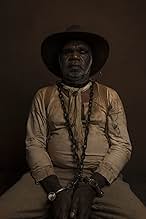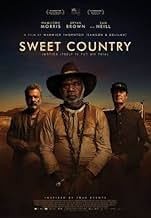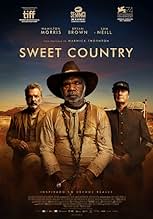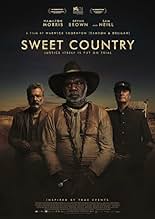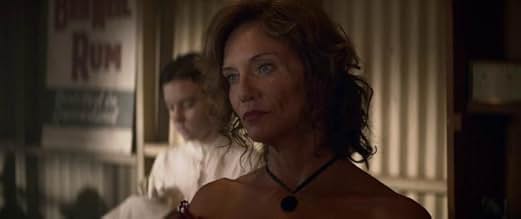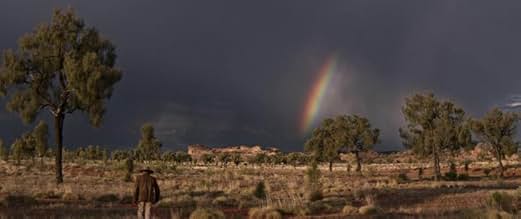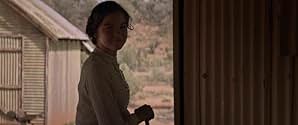Ajouter une intrigue dans votre langueWestern set on the Northern Territory frontier in the 1920s, where justice itself is put on trial when an aged Aboriginal farmhand shoots a white man in self-defense and goes on the run as a... Tout lireWestern set on the Northern Territory frontier in the 1920s, where justice itself is put on trial when an aged Aboriginal farmhand shoots a white man in self-defense and goes on the run as a posse gathers to hunt him down.Western set on the Northern Territory frontier in the 1920s, where justice itself is put on trial when an aged Aboriginal farmhand shoots a white man in self-defense and goes on the run as a posse gathers to hunt him down.
- Réalisation
- Scénario
- Casting principal
- Récompenses
- 22 victoires et 29 nominations au total
- Lizzie
- (as Natassia Gorey-Furber)
- Constable Campbell
- (as Lachlan Modrzynski)
Avis à la une
The similarity between Sweet Country and Malick's movies don't stop there. As Warwick Thornton used symbolism in Sweet Country in a way that resembles Malick's use of symbolism. By that I mean the use of allegories and symbols in a beautiful way that feels literary or poetic. Unfortunately, the use of symbols in Sweet Country often feels superfluous, and completely unnecessary.
Sweet Country is masterly edited, and I think that what makes it very watchable, and often enjoyable despite its poetic style that may indispose some people.
Thornton used intercut flash-forwards and flashbacks heavily. And while sometimes they help us understanding some events that happened, or will happen, therefore build tension, they often seem like nothing but artistic frippery, specially when they are used to make the movie seem if it has a non-linear storytelling.
Sweet Country also should be praised for its non-sentimental approach to its message. Unlike other movies that tackle the same subject matter, Sweet Country doesn't dramatize any aspect of its story. The movie even doesn't have a soundtrack, and that makes it feel more realistic. The movie relies on its bleak and dreary atmosphere to imply its subject matter and moral instead of presenting them in the usual manner.
All the performances are good. Hamilton Morris' performance is impressive because it feels genuine. Sam Neill is also very good even if his character, Fred Smith, is underdeveloped. Fred Smith is a very important character and should have been more developed, but unfortunately, it's a very flat character.
In general, the movie has some issues in terms of its characters. The movie has too many characters for its own good. And the movie tries to give almost every character its fair share of importance.
In the end, Sweet Country a movie of visuals first and foremost, it could hardly be more visually impressive. But, to be honest, it's a very pretentious work.
(7/10)
Both haunting and tragic, the film is politically provocative and poetically proverbial in narrating a dark era when Australia's justice system was still in its infancy. On the run for killing a cruel white settler, Aboriginal Sam (Hamilton Morris) and his wife have little chance of escaping the law, especially during a time when lawmakers were the laugh of the town. It doesn't help either that a frontier soldier (played by Bryan Brown) is out for blood as a self- proclaimed lawman. Sam's only aid is his charitable employer and preacher Fred (Sam Neil). But there's something about the whole incident that Sam and his wife have kept to themselves and the only way for any sliver of redemption is to get caught.
Although deliberately paced (the very first scene is a symbolic pot on the boil), the final showdown is suspenseful but also gut- wrenching and ultimately heartbreaking. An Aboriginal himself, Thornton (who is also the cinematographer) uses gorgeous vistas of the Australian landscape to juxtapose the ugly nature of this story with the sheer beauty of his land. And amongst all this beauty there is suffering, trauma, barbaric colonialism, and absolute disregard for human life. As impressive as the visuals is Thornton's meticulously composed storytelling and it's a power structure with imposing breath, width and emotional depth.
So lets speak about other aspects of the film: cinematography, acting and story telling are superb. But I liked most of all the editing, with these tiny flashes forward and backward throughout the movie, flashes we can fully understand only when we've seen the movie all the way through. Please do, I think you won't regret it.
Le saviez-vous
- AnecdotesThe film is based on a real life true crime murder case where an Aboriginal man was arrested and put on trial for murdering a white man in central Australia during the 1920s.
- GaffesUnder Australian law, an execution would not be carried out immediately (or the next day), as executions would need to be confirmed by the State Governor. There also be time allowed for appeals against the death sentence.
- Citations
Fred Smith: We're all equal here. We're all equal in the eyes of the Lord.
- ConnexionsFeatured in Sweet Country: Behind the Scenes (2018)
- Bandes originalesDown at Long Point
Written and Performed by Damien Lane
Meilleurs choix
- How long is Sweet Country?Alimenté par Alexa
Détails
Box-office
- Montant brut aux États-Unis et au Canada
- 104 297 $US
- Week-end de sortie aux États-Unis et au Canada
- 8 895 $US
- 8 avr. 2018
- Montant brut mondial
- 1 810 021 $US
- Durée1 heure 53 minutes
- Couleur
- Mixage
- Rapport de forme
- 2.35 : 1
Contribuer à cette page



